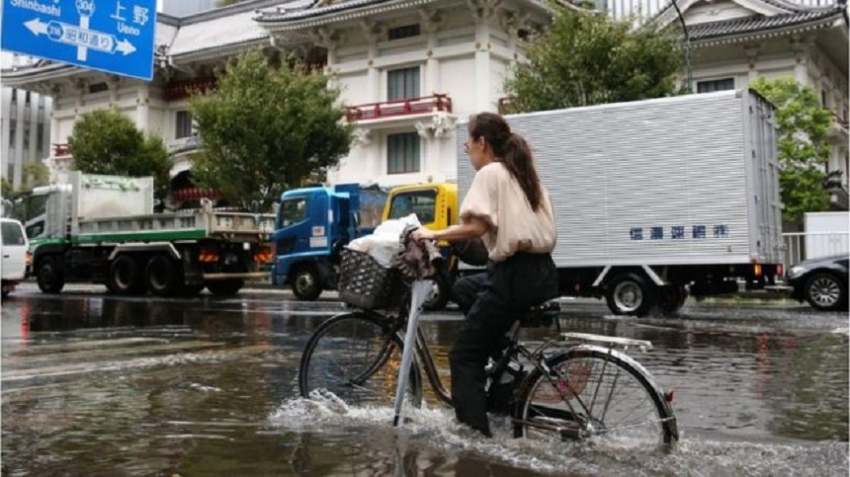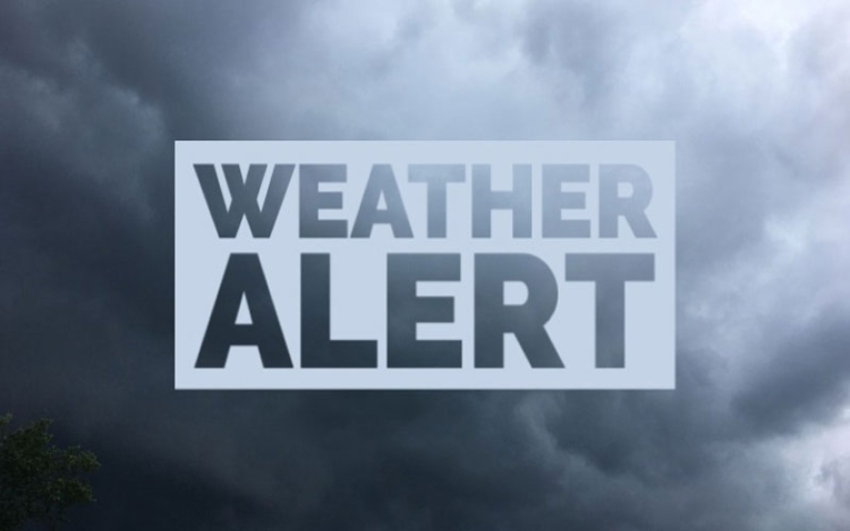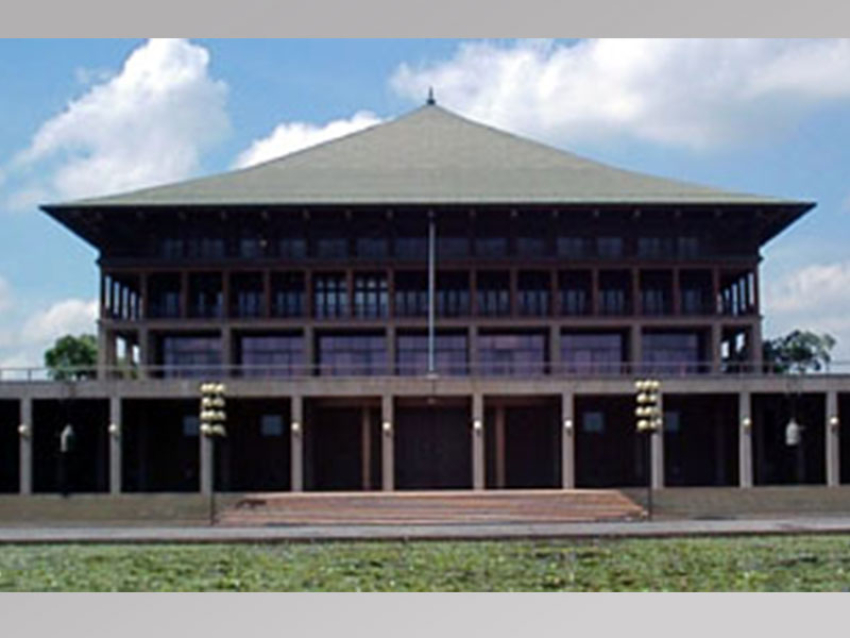Typhoon Faxai battered the Japanese capital with winds of up to 210km/h (130mph)More than 900,000 homes have been left without power after Typhoon Faxai made landfall near Tokyo.With winds of up to 210km/h (130mph), Faxai is one of the strongest typhoons to hit the Japanese capital in a decade.More than 130 flights were cancelled and train lines closed for hours, disrupting the morning commute.Power cuts hit 910,000 people in the Tokyo area, Japan's national broadcaster NHK said on Monday morning.The entire city of Kanagawa lost power at one stage, and authorities warned against going outside.
Hurricanes, typhoons and cyclones: What's the difference?
As the storm approached, non-compulsory evacuation warnings were issued to more than 390,000 people in Kanagawa, Shizuoka and Tokyo prefectures.A woman in her fifties was found unconscious on a street in Setagaya City, a residential area near central Tokyo, and later died in hospital, NHK reported.CCTV footage showed her being blown head-first into a building by the force of the wind.More than 30 people have been injured, according to Japanese news agency Kyodo.The storm comes as the country prepares to host the Rugby World Cup, which is expected to draw more than 400,000 overseas visitors.England manager Eddie Jones, a former manager of the Japanese national team, said his side would have to "ride with it".The Australian squad's arrival was delayed by the storm, while the French narrowly beat it to Japanese shores.Typhoon Faxai is now moving back out towards the Pacific, but there is still a risk of flooding and landslides.Japan's severe weather comes after a separate powerful typhoon swept over the Korean peninsula at the weekend, leaving eight people dead.North Korea's news agency KCNA said Typhoon Lingling had flooded 460 sq km (178 sq miles) of farmland.There are fears the storm could worsen severe food shortages in the country. Earlier this year, the UN warned that up to 10 million North Koreans were "in urgent need of food assistance."
Typhoon Lingling: Powerful typhoon passes over North Korea
A powerful typhoon has passed over the Korean peninsula, leaving five people dead and 460 houses damaged or destroyed in North Korea, according to state media.The storm flooded 460 sq km (178 sq miles) of farmland, the official KCNA news agency said, in a country already suffering food shortages.Typhoon Lingling earlier killed three people in South Korea.Flights were cancelled and tens of thousands of homes left without power.The typhoon struck North Korea at 14:00 local time (05:00 GMT) on Saturday, KCNA said.There were concerns the storm, which injured three people, could worsen already severe food shortages.Earlier this year, the UN warned that up to 10 million North Koreans were "in urgent need of food assistance".
Bad harvest leads to N Korea rations cut North Korean leader Kim Jong-un held an emergency meeting on Friday and scolded officials for their lack of action as Typhoon Lingling approached, KCNA said. The government was giving "primary attention" to the protection of crops as well as dams and reservoirs, the agency said.A satellite image of Lingling as it approached South Korea on Friday
Lingling made landfall in South Korea earlier on Saturday before heading north with winds gusting up to 140 km/h (86 mph), the South's Yonhap news agency reported.The Japan Meteorological Agency showed the storm weakening considerably on Sunday as it continued overland into China.
Typhoon Lingling battered Seoul and led to the closure of many roads South Korea is now recovering from the typhoon, according to Yonhap, with power restored to nearly all 160,000 affected homes and flights resuming.Lingling packed the fifth-strongest winds of any typhoon to hit the country, the agency said.
Japan typhoon leaves thousands stranded at the airport
By Jessie Yeung and Yoko Wakatsuki, CNN
(CNN)A powerful typhoon in Japan has left more than 100 flights canceled, thousands of travelers stranded at the airport, and nearly 1 million households without power.Typhoon Faxai, which made landfall early Monday morning in the coastal city of Chiba, brought heavy rain and winds of 120 miles per hour, according to the Japan Meteorological Agency (JMA).
The storm then moved over Tokyo and paralyzed transport. Major subway stations in Tokyo were crammed full of commuters on Monday morning, all stuck waiting for bullet trains and subway services that had shut down.
Commuters at a Japan Railways station, where trains were suspended due to Typhoon Faxai in Saitama on September 9, 2019.
Commuters at a Japan Railways station, where trains were suspended due to Typhoon Faxai in Saitama on September 9, 2019.
The train services gradually resumed mid-morning, but all lines are still experiencing delays.
More than 100 flights to and from airports in the Tokyo area were canceled on Monday, including 49 Japan Airlines flights and 41 by All Nippon Airways, according to the airport website. The entire Keikyu rail line, which connects Tokyo and Yokohama to Haneda Airport, is still suspended.
As of Monday afternoon, 6,800 passengers were stranded at Narita International Airport, according to an airport spokesperson. Flights are still arriving, but with highways blocked and two railways to the city center shut down, arriving passengers had no way to leave the airport.
Highways were shut down, departing ships were canceled at Tokyo Port, and rail lines closed on Sunday and Monday.
Photos show flooded streets, littered with downed trees and branches. Workers on Monday tended to signposts and lamps that had blown over, and employees at the Higashi Chiba train station inspected the roof, which was twisted and torn apart.
There are also widespread blackouts -- nearly a million households are without power, according to public broadcaster NHK. The entire islands of Shikinejima and Oshima off the country's south coast lost power, according to the Tokyo Disaster Prevention Department.
So far there have been no deaths reported, but at least ten people have been hospitalized, NHK said on Monday.
Ahead of the typhoon, JMA issued storm surge, flood, and landslide warnings, and asked the public to avoid going outdoors.
An evacuation advisory was issued Sunday night for about 150,000 people in the Kanagawa, Shizuoka, and Tokyo prefectures, with evacuation preparation information delivered to about 2.5 million people, according to NHK. Evacuation shelters were set up across Tokyo, including the city wards of Minato, Machida, Meguro and more.
By Monday mid-morning, most of the evacuation orders across Tokyo had been canceled, and storm warnings in the Tokyo area lifted. However, the Tokyo Disaster Prevention Management warned residents to remain alert for strong winds.
The typhoon is now forecast to move northeast away from Japan and into the open Pacific over the next day, with maximum wind speeds expected to weaken to 26 mph by Tuesday, according to JMA.




















